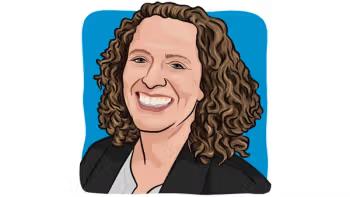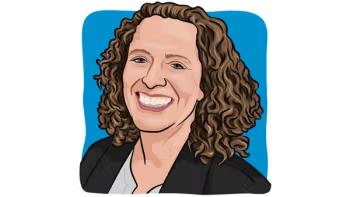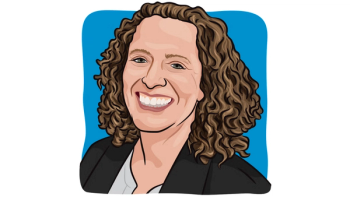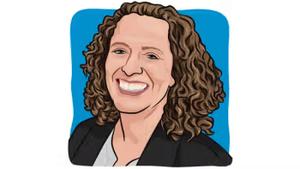
After five years in remission, a scan shows a small anomaly that might be recurrence, or it can show nothing, leaving a tense week before my oncologist visit.

Karen Cohn is a retired middle school special education teacher who was diagnosed with follicular lymphoma in July 2020, considered to be highly treatable, but chronic and incurable, which is currently in remission. She is also a fifth-degree black belt in TaeKwon-Do, and is the assistant instructor of a TaeKwon-Do class. She enjoys working part-time with special education students, crocheting, walking, indoor rock-climbing and talking to and petting any dog she sees.

After five years in remission, a scan shows a small anomaly that might be recurrence, or it can show nothing, leaving a tense week before my oncologist visit.

I have lived with both depression and cancer and know that illness, visible or not, ebbs and flows; canceled plans can reflect health limits, not rejection

Five years after finishing treatment for follicular lymphoma, I reflect on remission, scanxiety, life changes, and the joys and challenges of recovery.

Feeling like others have it worse can dismiss the real challenges of follicular lymphoma and leave patients without the support they need.

I share how my dog helped me through treatment during the pandemic and how adopting a new one reminds me to keep living and planning for a future beyond cancer.

After her follicular lymphoma diagnosis, Karen Cohn reflects on how cancer reshaped her view of mortality and her choice to keep living fully.

After treatment for follicular lymphoma, I reflect on how cancer, retirement, and loss reshaped my sense of normal and what life looks like now.

Living with follicular lymphoma, I’ve learned many assumptions about cancer, remission and treatment side effects don’t reflect the reality I face.

When treatment ended, people expected relief, but what I felt was loss, fear, and the weight of a life forever changed.

When asked to choose a word other than “survivor” to describe myself, I chose “person” because cancer does not define who I am.

Five years after my lymphoma diagnosis, life looks normal on the outside; however, the fear of recurrence and the reality of cancer never fully fade.

I was diagnosed with follicular lymphoma in 2020, during COVID, which forced me to retire early and taught me I’m more than a statistic.

I'm a follicular lymphoma survivor, and hearing others name the quiet, lasting changes of life after cancer made me feel seen and understood.

Four years after remission from follicular lymphoma, ongoing fear of relapse, lingering symptoms, and life stressors continue to weigh heavily on me.

It’s spring, a time for new beginnings following a cancer diagnosis; however, I have an ongoing issue that I can’t dismiss.

As a lymphoma survivor, I struggle with the positivity trap — sometimes, I just want my fears validated instead of being reassured everything is fine.

Life after treatment for follicular lymphoma brings long-term physical and emotional challenges, including immune system impacts and lasting social effects.

Living with follicular lymphoma, I challenge common misconceptions about cancer, highlighting the unique and varied experiences of patients with cancer.

My annual scan showed no cancer recurrence, but revealed some minor issues related to aging and potential fibroids, requiring monitoring and follow-up.

As a cancer survivor, I face added stress with an upcoming black belt test and "scanxiety" before my annual CT scan and oncology appointment.

Waiting for results of a CT scan after a cancer diagnosis is agonizing, as I anxiously await news on whether my disease has returned.

Despite being declared cancer-free after initial treatment, I grapple with survivor's guilt, questioning why my lymphoma responded to therapy while others did not.

When I started receiving treatment for follicular lymphoma, I wasn’t sure what to expect regarding treatment — and a lot of things were unexpected.

I’ve heard that trauma doesn’t make people stronger, and I’ve found that after cancer, I’m not the same person that I was before.

Even if care teams have all of your information on their end, advocating for yourself is still necessary during cancer treatment.

Whenever I get sick, I experience a few side effects that usually go away, but unexplained weight loss becomes a problem for me.

Recently, I met a fellow cancer survivor but after talking with her about cancer, I realized she had a different perspective than I did.

The militaristic terminology of “fighting a disease” does not sit well with me. After being diagnosed, I wasn’t fighting. I was reacting.

When I started experiencing symptoms of an infection, I was worried that my follicular lymphoma had returned.

Having a check-up appointment without receiving any type of scan is good, but also scares me.

Published: July 3rd 2024 | Updated:

Published: January 23rd 2026 | Updated:

Published: March 21st 2025 | Updated:

Published: March 7th 2025 | Updated: